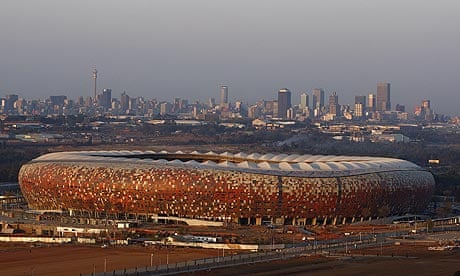South Africa is considering the introduction of zero tolerance policing ahead of next year's football World Cup, making it easier for officers to "shoot to kill" suspected criminals.
The proposal has raised fears of a return to "apartheid-era policing", with officers having the right to shoot fleeing suspects in the back.
The change in tone has come with the appointment of a new national police commissioner, Bheki Cele, who has been called a "cowboy" with a penchant for pinstripe suits and panama hats.
The plain-speaking Cele has called for a change in legislation that would allow police to open fire on suspects without having to worry about "what happens after that".
He received backing this week from Nathi Mthethwa, the country's police minister. "We are tired of waving nice documents like the constitution and the human rights charter in criminals' faces," Mthethwa said. "We are going to meet these thugs head on, and if it means we kill when we shoot, then so be it."
South Africa has one of the highest crime rates in the world, with an average of 50 murders a day. More than one person a day is shot by police, according to the country's Independent Complaints Directorate.
Mthethwa's remarks came the day after police gunned down six armed robbers outside Pretoria as they attacked a cash transit van.
The current law allows police to use lethal force only if their lives or the lives of innocent bystanders are in danger. They are not allowed to shoot at fleeing suspects, as they were before the constitutional court struck down the apartheid-era version of the Criminal Procedure Act.
Mthethwa denied that revisions to the law, to be presented to the South African parliament soon, would allow the police to apply their own brand of rough justice. "We must hasten to say that trigger-happy members of the police must not think that this is a licence to kill. It is a measure aimed specifically at serious violent crimes and dangerous criminals," he said.
The police minister also sought to allay fears that crime will blight the 2010 World Cup. "South Africa has hosted over 100 international events since democracy [reached the country]," he said. "Each time there has been anxiety. The message is, we would welcome visitors again."
But the proposed crackdown has alarmed rival politicians and civil liberties groups. The shadow police minister, Dianne Kohler Barnard, of the opposition Democratic Alliance, said: "I'm not keen to go back to apartheid-era policing. The police already have the right to use lethal force, but I think they want the right to shoot criminals in the back if they are running away."
She added that it was no coincidence the proposals had come before the World Cup and local elections. "There's a great fear that visitors will be harmed, which thankfully hasn't happened at major events up to now. We have to be very careful. We don't want shoot-outs in town centres where innocent people are seen as collateral damage. We don't want to be a police state all over again," she said.
Concerns deepened recently when it emerged that last year 538 police staff were found guilty of crimes such as murder, rape, theft and corruption. "One should be a little hesitant to give people like that more powers," Kohler Barnard said.
According to Jacob van Garderen, head of Lawyers for Human Rights, the law already gives police enough scope to police the country effectively. "These statements are cause for concern, and I am afraid that, even if they change the laws to become more draconian, they will not solve the crime problem," he told the Cape Argus newspaper.
"The real problem is not so much the law, which allows police to respond with the necessary force, but resources, the capacity of the police and their ability to work effectively with other government departments, such as the National Prosecuting Authority, when it comes to fighting crime."
